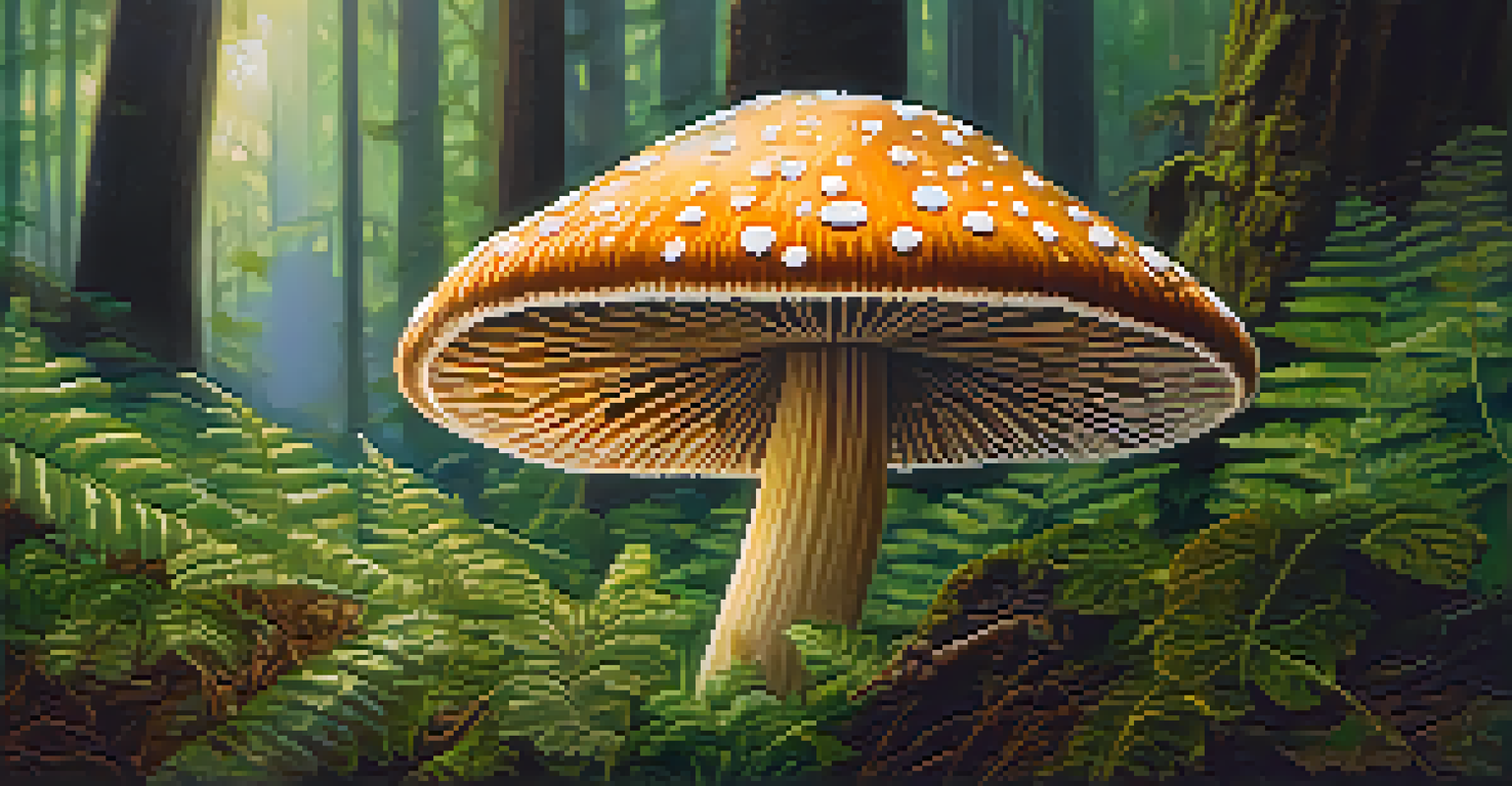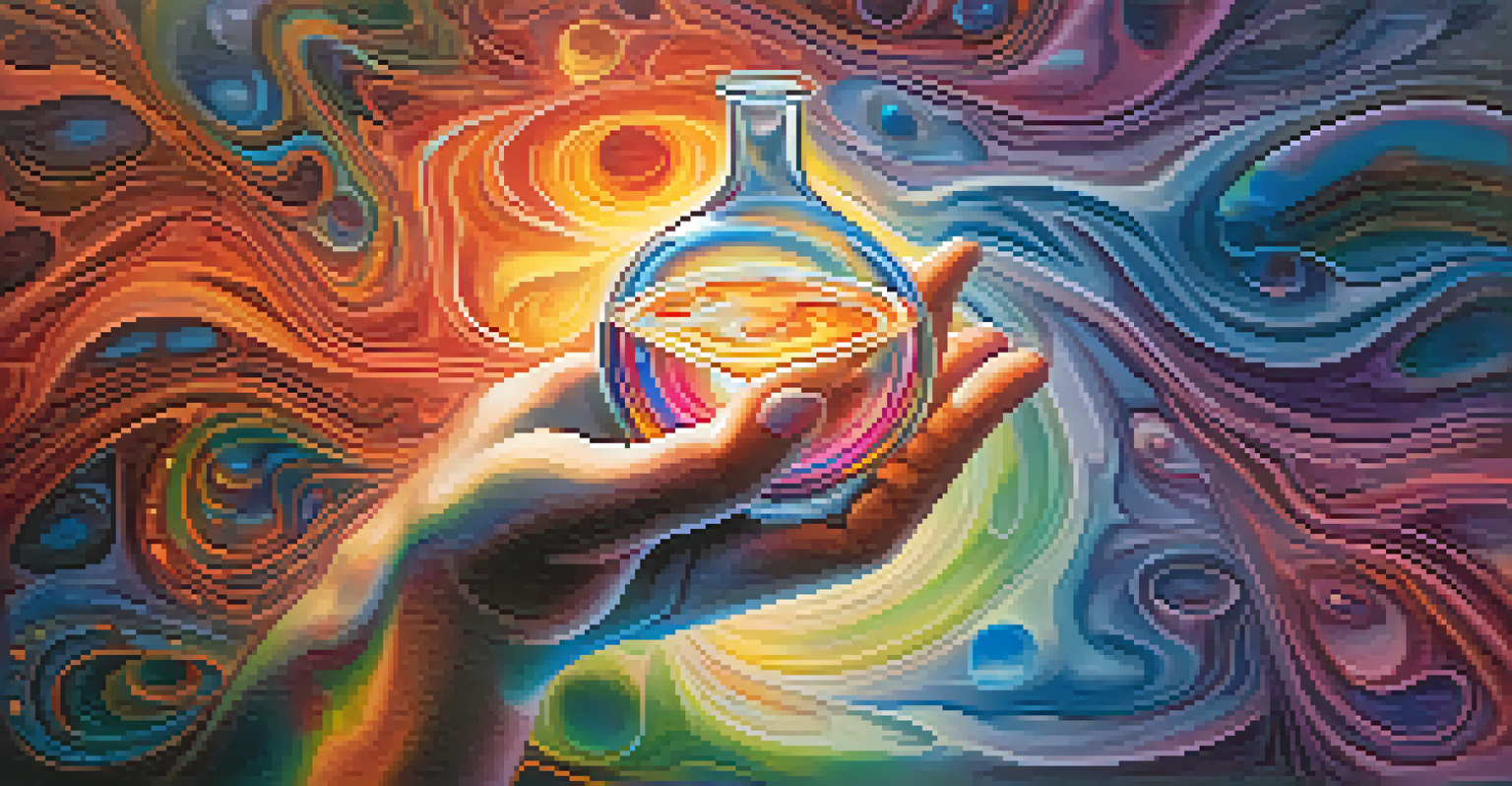Cultural Perspectives on Entheogens and Psychotherapy

Understanding Entheogens: A Cultural Overview
Entheogens have been used for centuries across various cultures for spiritual and healing purposes. These substances, often derived from plants, are believed to facilitate profound experiences that can lead to personal insight and emotional healing. In many indigenous societies, entheogens are integral to rituals and ceremonies, serving as a bridge to connect with the divine or the self.
The use of psychedelics in therapy is not about taking drugs, but about engaging in a deep conversation with oneself.
For example, the use of peyote in Native American Church ceremonies illustrates how these substances are not merely recreational but are steeped in tradition and respect. Participants often report transformative experiences that can lead to a greater understanding of their place in the universe. This cultural significance raises important questions about the role of entheogens in modern therapeutic practices.
As Western psychotherapy increasingly looks towards these substances for treatment, understanding their cultural roots becomes essential. It helps to ensure that they are used respectfully and effectively, acknowledging the rich traditions behind them rather than appropriating their use.
The Therapeutic Potential of Entheogens
Recent studies have highlighted the therapeutic potential of entheogens, especially in treating mental health conditions like PTSD, depression, and anxiety. For instance, psilocybin, found in certain mushrooms, has shown promising results in clinical trials, often leading to significant improvements in patients' mental health. This has sparked interest in integrating these substances into established therapeutic frameworks.

Therapists using entheogens report that these substances can facilitate deeper emotional connections and insights during therapy sessions. This can create a unique environment where patients feel more open and willing to confront difficult emotions and memories. The subjective experiences of patients often lead to breakthroughs that traditional methods may not achieve.
Entheogens in Cultural Healing
Entheogens have a long-standing cultural significance in various societies, serving as tools for spiritual connection and emotional healing.
However, it's crucial to approach this integration carefully, as the therapeutic use of entheogens requires a supportive and controlled setting. Without proper guidance, there can be risks involved, making it vital for practitioners to be well-informed and trained in both psychotherapy and the use of these substances.
Cultural Attitudes Towards Entheogens in Therapy
Cultural attitudes towards entheogens vary widely, influencing how they are perceived and utilized in psychotherapy. In some cultures, these substances are revered and respected, viewed as sacred tools for healing and self-discovery. In contrast, other societies may regard them with suspicion or as illicit drugs, complicating their acceptance in therapeutic contexts.
Psychedelics are the most powerful catalysts for personal growth and healing that we have ever known.
For example, while ayahuasca ceremonies are common in Amazonian cultures and are seen as healing experiences, the same substance may be stigmatized in Western contexts. This dichotomy highlights the need for culturally sensitive approaches when introducing entheogens into therapeutic practices. Understanding these perspectives can foster dialogue and help bridge the gap between traditional uses and modern therapy.
As mental health professionals explore the potential of entheogens, they must navigate these cultural landscapes thoughtfully. Engaging with local communities and respecting their traditions can pave the way for more effective and ethical integration of these powerful substances into therapy.
Legal and Ethical Considerations
The legal status of entheogens varies globally, impacting their accessibility for therapeutic use. In some countries, these substances have been decriminalized or are being studied for medical purposes, while in others, they remain strictly prohibited. This patchwork of laws creates challenges for researchers and therapists looking to explore their benefits.
Ethically, therapists must also consider the implications of using entheogens in their practice. Informed consent, patient safety, and the potential for misuse are critical issues that must be addressed. Establishing clear guidelines and ethical frameworks will be essential as the interest in entheogens continues to grow.
Therapeutic Benefits of Entheogens
Research shows that substances like psilocybin can effectively treat mental health issues such as PTSD, depression, and anxiety when used in therapy.
As the conversation around mental health evolves, so too must the legal and ethical landscapes surrounding entheogens. Advocating for responsible research and therapeutic use can help ensure that these substances are employed in ways that honor their cultural significance and maximize their healing potential.
Integrating Entheogens into Therapeutic Practices
Integrating entheogens into therapeutic practices requires a thoughtful and informed approach. Practitioners must be well-versed in both the pharmacology of these substances and the psychological principles of therapy. This dual knowledge base can help create a safe and supportive environment for patients exploring their inner worlds.
One way to facilitate this integration is through structured sessions where entheogens are used in conjunction with established therapeutic techniques. For instance, preparing clients for their experience and providing integration therapy afterward can help them process their insights and emotions. This holistic approach can lead to more profound and lasting changes.
Moreover, collaboration between traditional healers and modern therapists can enrich the therapeutic experience. By respecting and incorporating cultural practices, therapists can create a more inclusive and effective treatment environment that honors the rich histories of these substances.
Personal Stories: Healing Journeys with Entheogens
Personal anecdotes can shed light on the transformative power of entheogens in therapy. Many individuals share stories of profound healing experiences, where the use of substances like LSD or MDMA helped them confront trauma and gain new perspectives on their lives. These narratives often highlight the emotional breakthroughs that can occur when individuals feel a sense of connection to something greater than themselves.
For example, a veteran suffering from PTSD may find relief through guided psilocybin therapy, allowing him to process his experiences in a safe space. Such stories not only illustrate the efficacy of entheogens but also remind us of the human element in therapy—each person’s journey is unique and deserves to be honored.
Navigating Legal and Ethical Issues
The use of entheogens in therapy is complicated by varying legal statuses and the need for ethical frameworks to ensure patient safety and respect for cultural origins.
These personal accounts can also serve as powerful testimonials, encouraging others to explore similar paths toward healing. By sharing these experiences, individuals contribute to a growing body of evidence supporting the potential benefits of entheogens in therapeutic settings.
Future Directions: Research and Cultural Exchange
The future of entheogens in psychotherapy is bright, with increasing interest in research and cultural exchange. Studies are expanding worldwide, exploring the therapeutic benefits of various substances and their potential applications in treating mental health conditions. This growing body of research promises to deepen our understanding of how entheogens can be harnessed effectively and safely.
Moreover, cultural exchange between indigenous practices and modern science can lead to innovative therapeutic approaches. By respecting and learning from traditional uses, mental health professionals can enhance their practices while honoring the wisdom of those who have used these substances for generations.

As this dialogue continues, the potential for entheogens to play a significant role in the future of mental health treatment becomes more apparent. With careful consideration of cultural, legal, and ethical factors, we can pave the way for a more inclusive and effective approach to healing.